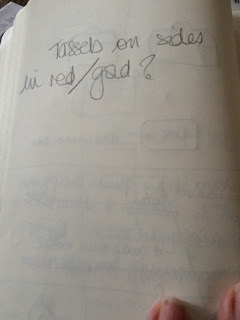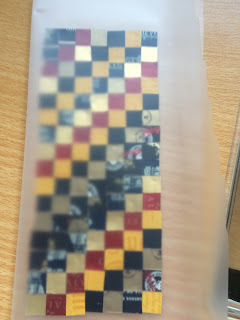Sampling.
I have taken photographs of my notebook to show where my ideas were recorded, either used, modified or dismissed.
There are also some sketches, some scribbles to record ideas or measurements.
Intermingled with these are some of the developments towards the final piece, so for instance, the fabric that I intended to use for each of the pieces of luggage; the paper pattern which was shaped to determine that it could be used for the texture of the fabrics.
There are images of the fabrics in the development stage and once developed
Notebook plan, sketches and scribbles
Then fabrics were developed
Gold thread automatic pattern on palm leaf for trolley base
Cable stitched silk using a range of wool, cord, metallics for one of the bags
Zebra print onto cotton
The pattern was stitches with granite stitch (white thread) and with blue glove thread in the bobbin, what would have been the black stripes on the top, were free embroidered in long and short stitches
Felt base, leftover thread, trapped under organza and free embroidered
Silk dyed rods, Stitched with contrasting threads and automatic patterns onto a silk base for a rucksack
Coffee tin seals stitched together to make a tea chest which will be 'rusted' with embossing powder and lined with acrylic waxed newspaper
Furniture leather stitched with glove thread to form a brief case which will be lined with gold figured leather
Wine bottle collars using a variety of colours, cut into 1cm sq and positioned to form a design
Temporary glue on a thin plastic to hold the metal
Design completed, plastic layer laid over metals to hold for stitching
Base fabric made with all plastic to be removed
LH image; Palm leaf, mulberry bark, birch bark and gold leaf. RH image, base fabric layer - squares of barks gilded and attached to the base palm leaf
Cotton base layer, padded with wool batting and using the top fabric design as a guide, overstitched to quilt, trapping Bonda-webbed scraps of Hindu newspaper printed fabric
Old Gelli plate fabric as base layer
Layering or fabrics, including organzas, nets, velvet, pin tucked cotton and silk to create a new fabric when overstitched with an automatic pattern
Reverse of above
Tyvek splashed with acrylic paint
Overlaid painted Tyvek with space dyed scrim
Tyke heated to shrink
Reverse of Tyvek with new fabric base
Hooped water soluble, with grid stitched in 'invisible nylon thread, then line stitched with loose ends
Stitching across the grid to suggest weaving
Mock-ups from patterns
Several paper patterns were made from which to craft the different bags. Some were modified from these patterns, some had no pattern
Each fabric and design was considered for suitability. I wanted to use as many types of fabric and techniques that were feasible for these elements of the final piece.
The trolley to support the pieces.
A bread container from a local baker seemed the ideal base on which to develop the trolley. Four coffee stirrers were also a useful basis form the handles of the trolley. The bread box has been modified and handles added, the embroidered palm leaf forms the floor of the trolley.
Development of the trolley
Dorset buttons will denote wheels and will be supported on a wire axle. The buttons will be made with scarlet and gold embroidery threads.
The ground supports at the wheel end will be made from bent wire, overstitched with threads and both these supports and the wheels, fed through slots in both the bread tray and the palm leaf base into the body of the trolley
Trolley development
Red silk will be embellished with gold thread and an edge of tassel added to create a vibrancy that reflects the Indian source; this will be shaped using Vilene Bonda-webbed support internally and draped freely externally to finish the trolley.
Each of the bags on the trolley will have an airport tag added.
I am really enjoying making this final sample - knowing when to stop as ideas come into my head is the controlling factor!
I look forward to having the sample completed very soon












































No comments:
Post a Comment